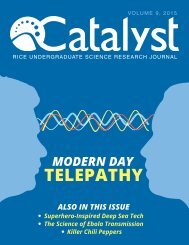Create successful ePaper yourself
Turn your PDF publications into a flip-book with our unique Google optimized e-Paper software.
Of course, many other proposed<br />
solutions fall outside of these mentioned<br />
categories. Each come with their own<br />
associated strengths and shortcomings,<br />
but all challenge previously-held<br />
assumptions about the field and<br />
contribute to a growing body of literature<br />
about the black hole information paradox.<br />
However, in spite of this progress, it will<br />
likely take many more years to observe<br />
what actually happens to information in a<br />
black hole, since current technology limits<br />
our ability to measure Hawking radiation<br />
and quantitatively observe the behavior<br />
of black holes. 8<br />
Instead of viewing the<br />
paradox as a conflict<br />
between quantum mechanics<br />
and general relativity, many<br />
regard it as an opportunity<br />
to reconcile the two<br />
foundational theories.<br />
Despite these challenges, the implications<br />
of the black hole information paradox<br />
remain profound. Instead of viewing the<br />
paradox as a conflict between quantum<br />
mechanics and general relativity,<br />
many regard it as an opportunity to<br />
reconcile the two foundational theories.<br />
As Moskowitz writes, the black hole<br />
information paradox urges a deeper<br />
need to “describe gravity according to<br />
quantum rules” and perhaps suggests the<br />
existence of another theory which unites<br />
the other two. Most scientists agree that<br />
discovering such a unifying theory of<br />
quantum gravity could marry quantum<br />
mechanics and general relativity, offering<br />
a satisfying resolution to the information<br />
paradox and inspiring a “conceptually<br />
new understanding of nature.” 3<br />
In the meantime, by improving scientific<br />
instruments, conducting research, and<br />
reexamining our underlying assumptions<br />
about the physical world, we can refine<br />
our existing theories about the black<br />
hole information paradox and develop<br />
new ones. Although the final answer<br />
remains ambiguous, we advance with<br />
tireless inquiry and curiosity about the<br />
mystique of space. In the process, our<br />
understanding—like our universe—<br />
inevitably continues to grow.<br />
WORKS CITED<br />
[1] Nagaraja, M. Black Holes. [Online] n.d. NASA. https://<br />
science.nasa.gov/astrophysics<br />
/focus-areas/black-holes (accessed Oct. 8, 2017).<br />
[2] Curiel, E.; Bokulich, P. Singularities and Black<br />
Holes. [Online] 2012, Fall 2012 Edition, n.p. Stanford<br />
Encyclopedia of Philosophy. https://plato.stanford.<br />
edu/entries/spacetime-singularities/ (accessed Oct. 28,<br />
2017).<br />
[3] Hossenfelder, S. Forbes. [Online] 2017. https://www.<br />
forbes.com/sites/startswithabang<br />
/2017/01/24/nobody-knows-where-a-black-holesinformation-goes/#7f04ed73767a<br />
(accessed Nov. 11,<br />
2017).<br />
[4] Baez, J.; Schmelzer, I. UCR Mathematics. [Online]<br />
1997. http://math.ucr.edu/home<br />
/baez/physics/Relativity/BlackHoles/hawking.html<br />
(accessed Oct. 28, 2017).<br />
[5] Cain, F. Universe Today. [Online] 2015. https://www.<br />
universetoday.com/119794/howdo-black-holes-evaporate/<br />
(accessed Oct. 29, 2017).<br />
[6] Toth, V. Forbes. [Online] 2017. https://www.forbes.<br />
com/sites/quora/2017/04/13/whydo-general-relativity-and-quantum-mechanics-need-tobe-unified/#3d650734aa2c<br />
(accessed Nov. 8, 2017).<br />
[7] Moskowitz, C. Scientific American. [Online] 2015.<br />
https://www.scientificamerican.<br />
com/article/stephen-hawking-hasn-t-solved-the-blackhole-paradox-just-yet/<br />
(accessed Nov. 8, 2017).<br />
[8] Strassler, M. Of Particular Significance. [Online] 2014.<br />
https://profmattstrassler.com/<br />
articles-and-posts/relativity-space-astronomy-andcosmology/black-holes/black-hole-information-paradoxan-introduction/<br />
(accessed Nov. 12, 2017).<br />
DESIGN BY Katrina Cherk<br />
EDITED BY Kelsey Sanders<br />
BLACK HOLE REGIONS<br />
ergosphere<br />
event<br />
horizon<br />
quiet region:<br />
negligible<br />
gravitational<br />
influence<br />
gravitational<br />
spacetime<br />
distortion<br />
singularity<br />
8 | CATALYST


![[Catalyst 2018]](https://img.yumpu.com/62125546/8/500x640/catalyst-2018.jpg)

![[Rice Catalyst Issue 14]](https://img.yumpu.com/68409376/1/190x245/rice-catalyst-issue-14.jpg?quality=85)
![[Catalyst 2019]](https://documents.yumpu.com/000/063/794/452/bc6f5d9e58a52d450a33a2d11dbd6c2034aa64ef/47664257444a666654482f6248345756654a49424f513d3d/56424235705761514739457154654e585944724754413d3d.jpg?AWSAccessKeyId=AKIAICNEWSPSEKTJ5M3Q&Expires=1715000400&Signature=MM%2FSe3ySpS43zil72NfVgs8zmj0%3D)
![[Catalyst Eureka Issue 2 2018]](https://img.yumpu.com/62125575/1/190x245/catalyst-eureka-issue-2-2018.jpg?quality=85)
![[Catalyst Eureka Issue 1 2017]](https://img.yumpu.com/58449281/1/190x245/catalyst-eureka-issue-1-2017.jpg?quality=85)
![[Catalyst 2017]](https://img.yumpu.com/58449275/1/190x245/catalyst-2017.jpg?quality=85)
![[Catalyst 2016] Final](https://img.yumpu.com/55418546/1/190x245/catalyst-2016-final.jpg?quality=85)
